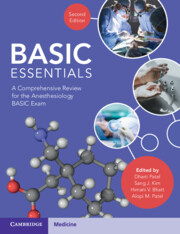Book contents
- BASIC Essentials
- BASIC Essentials
- Copyright page
- Contents
- Contributors
- Preface
- Abbreviations
- Chapter 1 Anatomy
- Chapter 2 Anesthesia Delivery Systems
- Chapter 3 Monitoring Methods
- Chapter 4 Ventilators, Alarms, and Safety Features
- Chapter 5 Defibrillators
- Chapter 6 Electrical, Fire, and Explosion Hazards: Basic Electronics
- Chapter 7 Basic Mathematics and Statistics
- Chapter 8 General Pharmacology
- Chapter 9 Anesthetics: Gases and Vapors
- Chapter 10 Opioids
- Chapter 11 Intravenous Anesthetics
- Chapter 12 Local Anesthetics
- Chapter 13 Muscle Relaxants (Depolarizing, Non-Depolarizing)
- Chapter 14 Understanding the Role of the Anesthesia Preop Evaluation
- Chapter 15 Preparation for General Anesthesia and Premedication
- Chapter 16 Regional Anesthesia
- Chapter 17 General Anesthesia
- Chapter 18 Monitored Anesthesia Care and Sedation
- Chapter 19 Intravenous Fluid Therapy in the Perioperative Period
- Chapter 20 Complications of Anesthesia: Etiology, Prevention, and Treatment
- Chapter 21 Postanesthesia Recovery Period: Analgesics
- Chapter 22 Postoperative Period: Consequences of Anesthesia and of Surgical Incisions
- Chapter 23 Central and Peripheral Nervous System
- Chapter 24 Pain Mechanisms and Pathways
- Chapter 25 Autonomic Nervous System
- Chapter 26 Central Nervous System: Anatomy
- Chapter 27 Respiratory System: Physiology
- Chapter 28 Respiratory System: Anatomy
- Chapter 29 Respiratory System: Pharmacology
- Chapter 30 Cardiovascular Physiology
- Chapter 31 Basics of Cardiopulmonary Resuscitation, Medications, Defibrillators, and Advanced Cardiac Life Support Algorithms
- Chapter 32 Cardiovascular System: Anatomy
- Chapter 33 Cardiovascular System: Pharmacology
- Chapter 34 Anesthesiology for the Gastrointestinal and Hepatic Systems
- Chapter 35 Renal Anatomy and Physiology
- Chapter 36 Renal Pharmacology
- Chapter 37 Hematologic System: Coagulation, Anticoagulation, Antiplatelet, and Thrombolytics
- Chapter 38 Transfusions
- Chapter 39 Reactions to Transfusions
- Chapter 40 Endocrine and Metabolic Systems
- Chapter 41 Neuromuscular Physiology and Disorders
- Chapter 42 Special Problems or Issues in Anesthesiology
- Chapter 43 Appendix
- Index
- References
Chapter 35 - Renal Anatomy and Physiology
Published online by Cambridge University Press: 21 February 2025
- BASIC Essentials
- BASIC Essentials
- Copyright page
- Contents
- Contributors
- Preface
- Abbreviations
- Chapter 1 Anatomy
- Chapter 2 Anesthesia Delivery Systems
- Chapter 3 Monitoring Methods
- Chapter 4 Ventilators, Alarms, and Safety Features
- Chapter 5 Defibrillators
- Chapter 6 Electrical, Fire, and Explosion Hazards: Basic Electronics
- Chapter 7 Basic Mathematics and Statistics
- Chapter 8 General Pharmacology
- Chapter 9 Anesthetics: Gases and Vapors
- Chapter 10 Opioids
- Chapter 11 Intravenous Anesthetics
- Chapter 12 Local Anesthetics
- Chapter 13 Muscle Relaxants (Depolarizing, Non-Depolarizing)
- Chapter 14 Understanding the Role of the Anesthesia Preop Evaluation
- Chapter 15 Preparation for General Anesthesia and Premedication
- Chapter 16 Regional Anesthesia
- Chapter 17 General Anesthesia
- Chapter 18 Monitored Anesthesia Care and Sedation
- Chapter 19 Intravenous Fluid Therapy in the Perioperative Period
- Chapter 20 Complications of Anesthesia: Etiology, Prevention, and Treatment
- Chapter 21 Postanesthesia Recovery Period: Analgesics
- Chapter 22 Postoperative Period: Consequences of Anesthesia and of Surgical Incisions
- Chapter 23 Central and Peripheral Nervous System
- Chapter 24 Pain Mechanisms and Pathways
- Chapter 25 Autonomic Nervous System
- Chapter 26 Central Nervous System: Anatomy
- Chapter 27 Respiratory System: Physiology
- Chapter 28 Respiratory System: Anatomy
- Chapter 29 Respiratory System: Pharmacology
- Chapter 30 Cardiovascular Physiology
- Chapter 31 Basics of Cardiopulmonary Resuscitation, Medications, Defibrillators, and Advanced Cardiac Life Support Algorithms
- Chapter 32 Cardiovascular System: Anatomy
- Chapter 33 Cardiovascular System: Pharmacology
- Chapter 34 Anesthesiology for the Gastrointestinal and Hepatic Systems
- Chapter 35 Renal Anatomy and Physiology
- Chapter 36 Renal Pharmacology
- Chapter 37 Hematologic System: Coagulation, Anticoagulation, Antiplatelet, and Thrombolytics
- Chapter 38 Transfusions
- Chapter 39 Reactions to Transfusions
- Chapter 40 Endocrine and Metabolic Systems
- Chapter 41 Neuromuscular Physiology and Disorders
- Chapter 42 Special Problems or Issues in Anesthesiology
- Chapter 43 Appendix
- Index
- References
Summary
Renal function plays a key role in the body homeostasis as well as perioperative management of fluids. This chapter discusses the renal system anatomy and physiology as well as various metabolic disturbances of electrolytes including potassium, sodium, calcium, and magnesium.
Keywords
- Type
- Chapter
- Information
- BASIC EssentialsA Comprehensive Review for the Anesthesiology BASIC Exam, pp. 190 - 196Publisher: Cambridge University PressPrint publication year: 2025

